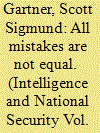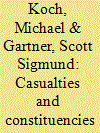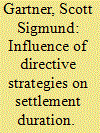| Srl | Item |
| 1 |
ID:
124117


|
|
|
|
|
| Publication |
2013.
|
| Summary/Abstract |
Strategic situations create motivational biases that help to predict the type of errors intelligence communities are more likely to commit (Type I errors predict behavior never observed, while Type II errors fail to predict behavior later observed). When the dangers of inaction are low and the cost of action high, the intelligence community is more likely to fail to predict threats (Type II error). If the dangers of inaction are high and the costs of military action low, it is more likely to predict mistakenly threats never observed (Type I error). Studies of US and Israeli decision-making and analyses of two new experimental studies support this theory. The key is to recognize the incentives for error and to develop systems that, at worst, lead to intelligence errors (mistakes consistent with a state's national security needs) and not intelligence failures (errors contrary to national security requirements).
|
|
|
|
|
|
|
|
|
|
|
|
|
|
|
|
| 2 |
ID:
067394


|
|
|
| 3 |
ID:
133147


|
|
|
|
|
| Publication |
2014.
|
| Summary/Abstract |
Are Directive Strategies in international disputes the most effective mediation method for obtaining durable peace? A standard statistical analysis shows no effect of Directive Strategies on settlement durability. This result however, is misleading, failing to take selection and indirect effects into account. In this article, I identify when selection and process effects reinforce or oppose each other. Directive Strategies have opposing negative selection and positive process effects, which can distort inferences about their influence. Strategies' direct and indirect effects are also examined. Directive Strategies are more likely to lead to Full Settlements - the most comprehensive form of agreement, which improve the settlement durability (an indirect effect). However, Directive Strategies are used in more intractable disputes that result in fragile settlements (a direct effect). A statistical analysis of international disputes that takes these conflicting dynamics into account demonstrates the efficacy of Directive Mediation Strategies in producing durable agreements.
|
|
|
|
|
|
|
|
|
|
|
|
|
|
|
|
| 4 |
ID:
065804


|
|
|
| 5 |
ID:
158849


|
|
|
|
|
| Summary/Abstract |
Why do states shift from opposition to torture to its employment in the face of widespread abhorrence and claims that it generates unreliable information? The expected value of acting upon unreliable information depends on the state’s appraisal of the type of error it might be committing. States may value avoiding Type I errors, which result from acting upon incorrect intelligence, differently than avoiding Type II errors, which result from failing to act on an undetected threat. Interrogations yield a mix of truth and lies; operations employing this information will avoid making Type II errors but will also make Type I errors. A state’s preference over error type changes with circumstances (as we show, occurs in Turkey and the United States), leading states to adopt coercive interrogation techniques despite secular abhorrence of torture. Our results suggest anti-torture advocacy might be more effective targeting preferences over error types than reinforcing anti-torture moral imperatives.
|
|
|
|
|
|
|
|
|
|
|
|
|
|
|
|